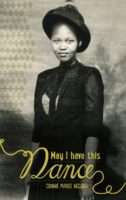Now, as I write this, I am eighty-four years old. My family now is different to what it was when I was a young girl. My parents and brothers are all dead, but I have twenty-two grandchildren and eight great-grandchildren. My sister Olga is ninety-six years old. She lost her eyesight four years ago. We still talk about our life at Cala as though it was yesterday.
My children have brought me such pride and happiness, although my heart aches for Tammie, my firstborn child, who died in October 2005 at the age of fifty-four. He had TB and meningitis but chose to rely on traditional rather than western medicines. I still miss his deep voice and powerful, loud laughter at family gatherings.
My soulmate, Sol, passed away in January 2013. The hole he has left in my heart will never heal. I still plant carnations and roses in my garden. Carnations are especially dear to me because when they are finished growing, instead of shedding their petals they fold inwards, protecting the growing new seeds.
Before he passed, Sol wrote a chapter for this book. It is about knowing me through all the stages of my life – the four Ms, as we called it. He knew me as Manse, the young woman; as Mama, the mother to his children; as MaHlongwane, which is my clan name and speaks to my role as a community worker; and as Makhulu, a grandmother and advisor.
Thank you for your trust, your love and your words, Sol. I will always love you.
I am Bro Sol, as called by the writer.
Manse at twenty was tall and slender. I first saw her at the Butterworth train station. What I saw never left my mind. Fortunately, six months later I recognised her at the nurse’s home at Frere Hospital.
At thirty, she was Mama to five of my children. At the same time she was my dance partner and a reliable, loving wife to me. By forty she was Mama to our six children, of which three were already boarding at high school and the rest were at home, close to their parents’ love and helping us weave ladies’ bags for our family business.
At fifty, she was MaHlongwane, the community worker. By now all the children were at high school or studying at college or university. As parents, we faced a lot of challenges due to political turmoil. The children’s education was disrupted by detentions and even going into exile.
At sixty, we were both forced to retire unexpectedly after she spent a year in detention, together with two of our sons. We had to reorganise our lives to adjust to the situation, working very hard to meet our financial needs.
At seventy, she was Makhulu, grandmother. By now we had overcome all our obstacles and were enjoying a loving environment in a comfortable home, surrounded by our older grandchildren and about fifty innocent young children placed in our care by their parents. Happiness and laughter at its best.
Makhulu at eighty is taking things easy, moving around slowly, watering her flower garden, all the while carrying a pen and paper. She is telling everyone that her book will be on the shelves by the time she turns eighty- three. I honestly believe her, because of her strength. Yes, I know all her four M’s well.
***
Tell us: Did you enjoy this autobiography? What part did you like best and why?


